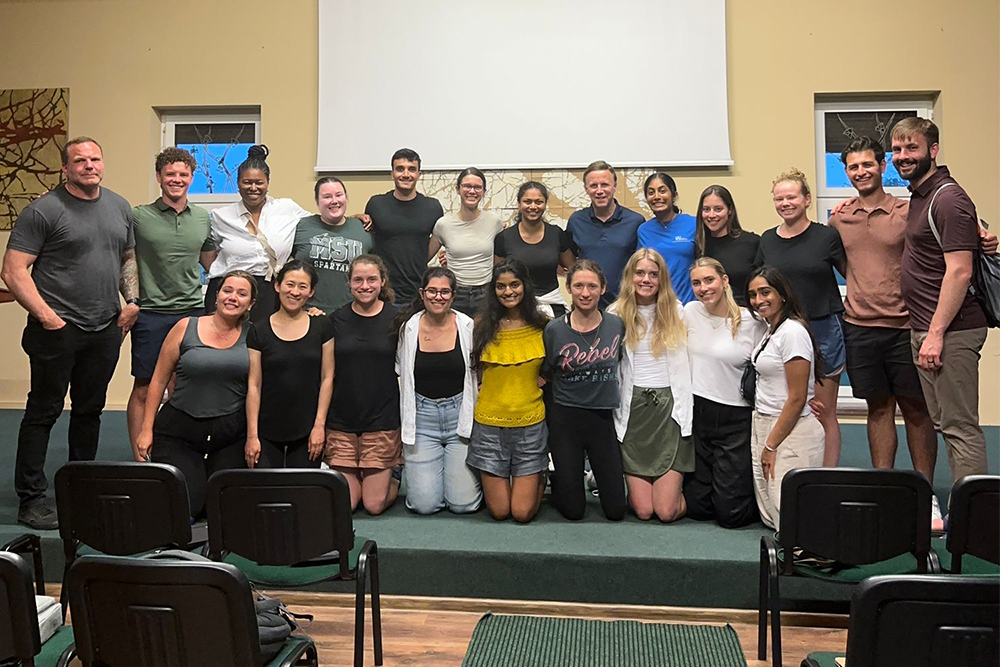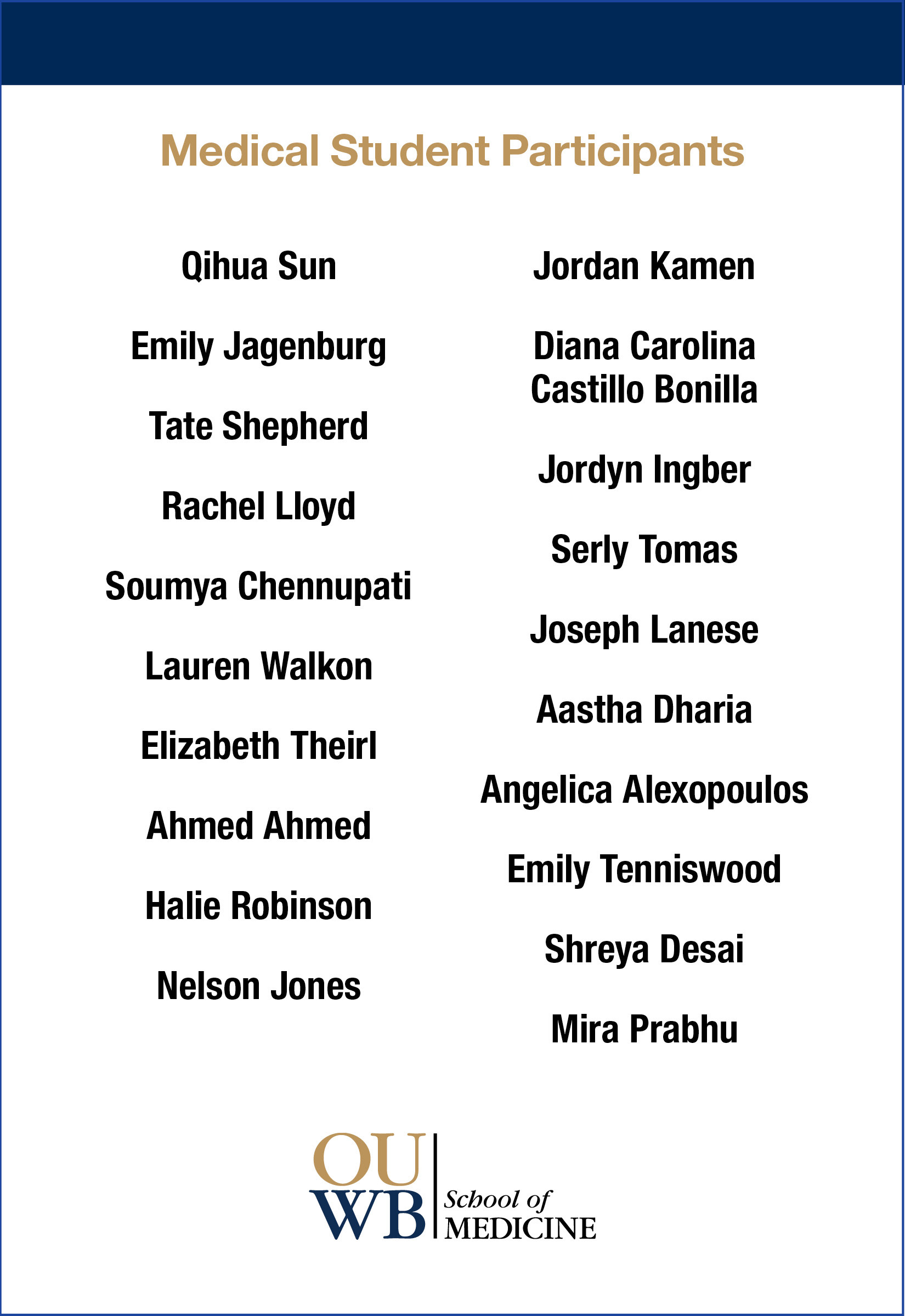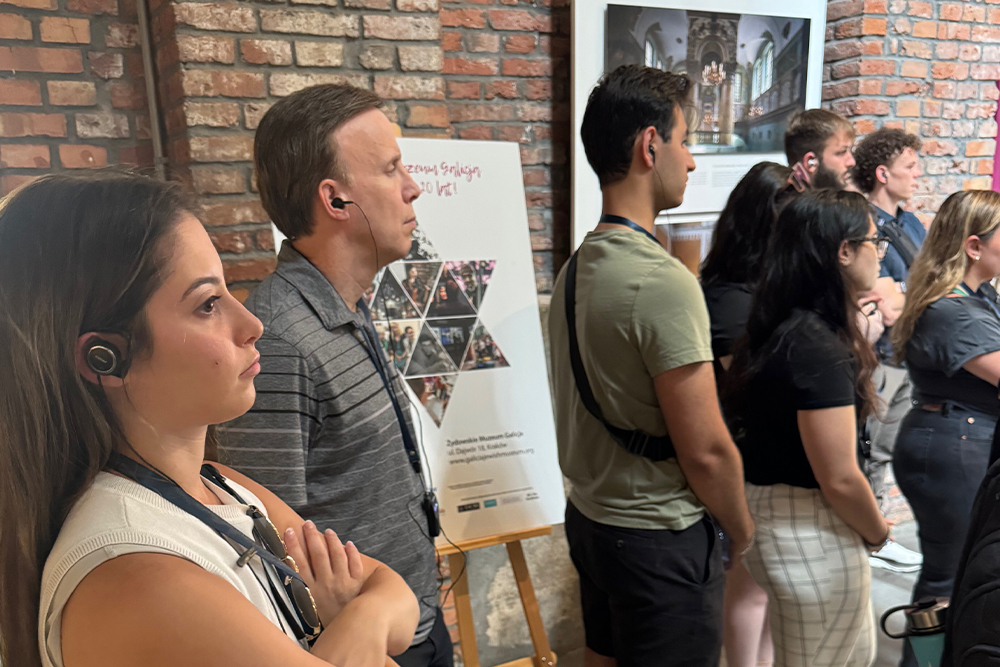
A visit to a former concentration camp is somber, emotional, thought-provoking, transformative — and especially eye-opening for someone like Christopher Carpenter, M.D.
The reason?
Carpenter viewed the experience through several lenses: As the dean of Oakland University William Beaumont School of Medicine; as a longtime practicing physician, and, of course, as a human.
It was all part of the OUWB Study Trip to Auschwitz — the third consecutive year the journey of personal and professional discovery has been made by a cohort of 20 future physicians from the school. (See info box for full list of students.)
Carpenter, named Stephan Sharf Dean of OUWB effective July 15, went on the study trip for the first time and recently shared his thoughts on the experience.
“Initially, I viewed everything as the dean…I was in a role of recognizing that the focus of the program is for our students, and for them to gain this amazing perspective,” says Carpenter. “But as the week evolved, I felt I was more of a participant, too. Recognizing that I’m 30 years ahead of them, I was able to share some of my own experiences and perspectives and I felt like the students gained from that.”
They did, according to second-year medical students like Ahmed Ahmed.
“(Carpenter) was able to share with us the parallels between the choices he’s had to make, and the choices physicians faced back then,” he said.
“It was incredibly valuable to have a physician with three decades of experience with us on the study trip.”
‘Really impressed’ by students
 |
In June 2022, Oakland University William Beaumont School of Medicine began offering a new transformative learning opportunity to its medical students through the OUWB Holocaust and Medicine program.
Part of the program — the OUWB Study Trip to Auschwitz — is designed to prompt students to delve into this distinctive and tragic era in the history of medicine and critically reflect on its implications for one’s own personal and professional development within the medical profession. The study trip relies entirely on donor funding.
This year, the study trip took place June 13-20.
Upon arrival, the group spent two full days in Krakow, where they participated in tours intended to help the medical students better understand how Jewish people lived pre-war, and how things changed relatively quickly leading up to and during World War II.
Sites visited in Krakow included the Galicia Museum, Eagle Pharmacy, Ghetto Heroes Square, and the Oskar Schindler Factory, which features a permanent exhibition called “Krakow under Nazi Occupation 1939-1945.”
Jason Wasserman, Ph.D., professor, Department of Foundational Medical Studies, and program co-director, has called the time in Krakow a “ramp up” to tours later in the week.
The deep dive into Jewish life and history continued the third day of the trip when the group moved to Oswiecim, the location of the Auschwitz I and Auschwitz-Birkenau concentration camps. The cohort visited the Oshpitzin Jewish Museum and learned more about the town.
On the fourth day of the week, the group visited Auschwitz 1. English-speaking tour guides led students through the site of the former concentration camp. Many former cellblocks have been turned into exhibitions, each designed to help today’s visitors better understand what once took place within the very walls.
Carpenter (left of sign) and OUWB medical students listen to a tour guide in the Galicia Museum. |
The following day, the group toured the massive site of the former Auschwitz-Birkenau.
Carpenter says the impact of physically being in such places is “more tangible and more immediate” than studying them from afar.
“It’s not like watching a movie, where you feel like you’re a distance from it,” he says. “You’re there and you see the ruins of crematoriums…the gas chambers, the bunks.”
Reflective writing sessions were held at the end of most days during the study trip.
Students like Tate Shepherd say having Carpenter participate in the sessions helped tie everything together.
“There were many instances in which (Carpenter) provided insight and examples of when he or other physicians he’s known throughout his career exemplified moral courage or other times when their integrity as physicians was tested,” he says.
“(Carpenter) did a good job of bringing in examples that helped us understand some of the choices that were made,” adds Shepherd. “It was really helpful as I tried to imagine myself as a future physician and facing similar situations.”
Concurrently, Carpenter says the sessions helped him understand how students were processing the experience. He calls them “amazing…courageous, thoughtful, and mindful.”
“Everyone walked in as individuals who knew each other, but they walked out as more of a family,” he says. “People were openly sharing how they were feeling, what they were struggling with.”
“I was really impressed with them, and I think they’re all different because of this trip,” adds Carpenter.
Much of the last day was spent reflecting on the week. It included a lecture from Krzysztof Antonczyk, head of Auschwitz’s digital archive and tour guide, that was titled “Why am I here? The meaning and human value of our work in Auschwitz.” Time also was dedicated to allow students to discuss trip-related projects they plan to pursue upon their return to the U.S.
“It was an amazingly impactful experience for the students,” says Wasserman. “The student group was phenomenal and took it with the seriousness that the topic deserves.”
A seven-week seminar follows the OUWB Study Trip to Auschwitz, taken for credit as part of the Medical Humanities and Clinical Bioethics (MHCB) 3 course, in which students discuss and reflect upon the trip experience, the relevance of this history to contemporary medicine, and develop projects to disseminate what they learned at a symposium dinner as well as to other community groups at OUWB, OU, and beyond.
‘Cascade of compassion’
It can take awhile to completely process a visit to a place like Auschwitz.
But Carpenter says he’s already given it a tremendous amount of thought, especially with regards to how it will impact the students for the rest of their lives.
| More from OUWB |
‘Life-changing’: OUWB students return from study trip to Auschwitz M3 shares thoughts on OUWB Study Trip to Auschwitz during AAMC event |
“They’re not only going to be better physicians, but they’ll make the physicians around them better, too,” he says. “As they move into leadership roles throughout their careers, there will be the obvious cascade of technical knowledge, but also a cascade of compassion and humanism.”
Carpenter adds that he believes the students “will be stronger individuals because of the experience, too.”
“They’re going to be able to reflect back on what they saw, heard, and learned and ask themselves if it can be applied to situations they encounter,” he says.
The unique insight afforded by the study trip also left Carpenter feeling even more proud of the students who graduate from OUWB.
“This type of program makes us the school that we are,” he says. “Our focus on humanism and medicine is obvious in a lot of other areas, but this really brings it home.”
“You can’t get this experience in any other way,” he adds. “This is the most moving, sobering experience I’ve had as a dean and I think the students and faculty would agree.”
For more information, contact Andrew Dietderich, senior marketing specialist, OUWB, at [email protected].
To request an interview, visit the OUWB Communications & Marketing webpage.
This work is licensed under a Creative Commons Attribution-NonCommercial 4.0 International License.


